
Granular guitar habits
Chapters 13 - 16
* Small choices add up. Every time you pick up your guitar, you reinforce the habit of playing. Every time you skip practice, you reinforce not playing. Little moments set the tone for everything.
* Decisive moments matter. The moment you sit down with your guitar, you’re either setting up for a productive session or setting yourself up for distractions. Winning these small moments is key.
* Use the 2-minute rule. If a habit feels like too much effort, scale it down. Instead of committing to an hour-long session, just tell yourself:
* “I’ll hold my guitar for 2 minutes.”
* “I’ll play a single chord change.”
* “I’ll play for the length of a song.”
* Once you start, you’ll naturally keep going. The hardest part of practice is getting started. By making the starting point too easy to fail, you remove resistance.
* Create a simple starter habit. Before worrying about structure or optimisation, just have a go-to way to start. It could be:
* A warm-up riff.
* A few strums of a familiar chord progression.
* Playing the first note of a song.
Anything that lowers the barrier and makes starting effortless.
* Doing a tiny habit consistently beats doing nothing. Playing for 2 minutes daily builds more momentum than waiting for the "perfect" hour-long session that never happens.
* Gradually stretch the habit. Once picking up the guitar becomes second nature, longer practice sessions will follow naturally. The goal is to make starting frictionless and irresistible.
The key? Don’t focus on the full session—just focus on starting. Once you do that, the rest takes care of itself.
Chapter 13 - Making Guitar Habits Easy - The 2-Minute Rule
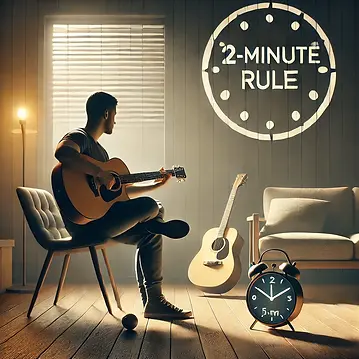

I reinforce the habit of playing by playing everyday, there is no excuse, there is no skipping practice !
I have fully embraced the 2 minute rule and use it for all my exercises, in my experience 2 minutes is a brilliant amount of time to commit. Short enough to be completed before boredom kicks in and long enough to work on an exercise where I can concentrate fully.
I fully agree the hardest part is getting started, the only way past this is to make it a daily habit - remove the excuses where possible.
I definitely consider that having a clearly defined routine gives you the ‘starter habit’. However, I do think this is unique to each person and each person needs to develop these starter habits that motivate them.
As part of the 66 day bootcamp we will look specifically at your starter exercise as one that really helps get you going into the full practice routine !
Chapter 14 - Making Bad Guitar Habits Impossible - Remove The Option To Fail

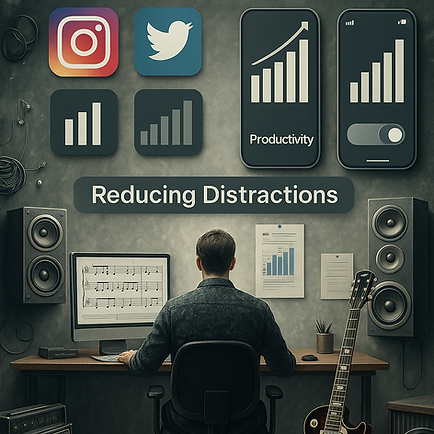
* If you want to stop bad habits, make them impossible to do easily. Procrastination, distractions, and mindless noodling happen because they’re too easy. Your environment should make bad habits inconvenient and good habits automatic.
* Use commitment devices to block distractions.
* Lock your phone away during practice.
* Leave your laptop in another room if it pulls you toward browsing instead of playing.
* Schedule practice sessions in advance so you don’t rely on willpower.
* Automate good habits so they happen naturally.
* Set recurring reminders for practice.
* Use phone blockers or productivity apps to prevent distractions.
* Uninstall social media or restrict access during your playing time.
* Increase the friction of skipping practice.
* If you tend to mindlessly pick up your guitar and noodle instead of practicing properly, move your guitar to your dedicated practice space—where it’s set up for focused playing.
* If you keep putting off playing, set up your practice area the night before so it’s effortless to start.
* One-time actions can eliminate bad habits for good.
* Delete apps that waste time.
* Block distracting websites during practice hours.
* Only allow yourself to check social media after you’ve played for 30 minutes.
* When bad habits become impractical, good habits take over. If you make procrastination harder than practicing, you’ll naturally pick up your guitar more often.
The goal? Make it easier to play than to waste time. The best guitarists aren’t more disciplined—they just set things up so practicing is the default.
Thankfully I have found once I have started my practice routine I don’t get that distracted. I have a set amount to get done and can’t finish until it is done, this approach is what I am pushing in the 66 day bootcamp.
I definitely suffer from getting distracted in all other areas of my life ! The point of the bootcamp and 7 points is to set you up with good habits, get to the point where the friction of skipping practice is tense, you really don’t want to miss it !
Chapter 15 - Making Guitar Habits Satisfying - Hook Yourself On Progress
* Satisfaction drives repetition. The more enjoyable and rewarding practice feels, the more likely you are to keep doing it. Make playing feel good now, not just in the future.
* Our brains crave instant gratification. The problem with long-term guitar progress is that results take time. If practice feels like only a grind, it won’t stick.
* Add immediate rewards to practice.
* Pair playing with something enjoyable—like listening to a great album after a session.
* Treat yourself to a fun jam after structured practice.
* Finish each session with something satisfying, like playing a song you love.
* Make progress feel obvious.
* Nail a tricky exercise? Celebrate it.
* Smooth out a chord change? Recognize that win.
* Small victories keep motivation high.
* Use immediate reinforcement to stay consistent. Early on, the skill rewards aren’t instant, but the satisfaction of showing up and making progress should be.
* Over time, playing itself becomes the reward. As your skills improve, practice stops feeling like work and starts feeling like its own payoff. The trick is to stick with it until that shift happens.
* Pick rewards that align with your identity as a guitarist. If your reward contradicts your progress (like skipping practice for a Netflix binge), it’s working against you. Make sure your incentives keep you moving forward.
The goal? Make guitar practice addictively enjoyable. If it’s rewarding in the moment, you won’t need willpower—you’ll just want to play.
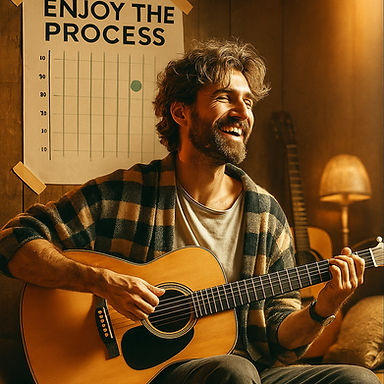
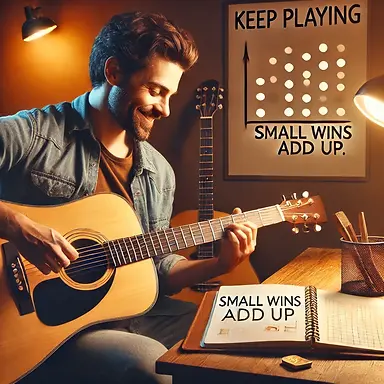
Hook yourself on progress ! This could be the summary of the 66 day bootcamp, you will make progress if you play every day in a structured fashion.
You have to fight that craving for instant gratification - it is so strong and has been made worse by social media. My breakfast, lunch, dinner analogy definitely covers the breakdown of practice to include something fun, tracking your practice and routine really helps you be able to celebrate progress to keep building motivation and desire to continue to want to play.
This point:
* Over time, playing itself becomes the reward. As your skills improve, practice stops feeling like work and starts feeling like its own payoff. The trick is to stick with it until that shift happens.
Is especially valid to what I am trying to get the bootcamp to do - get past the hump, when practice starts feeling like it is paying off it is self reinforcing
Chapter 16 - Tracking Guitar Habits - Keep Yourself Accountable

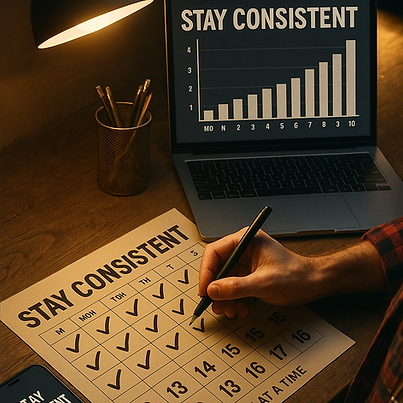
* Use a simple habit tracker to log your practice sessions. Whether it’s a notebook, an app, or just marking an ‘X’ on a calendar, seeing your progress visually is motivating.
* Tracking makes progress feel real. When you can see your effort stacking up, you’re more likely to keep going. It’s satisfying to watch your streak build.
* Make your guitar habit obvious. A visible tracker reminds you to pick up the guitar. If you’re serious about progress, track it.
* Don’t break the streak. If you miss a day, get back on track immediately. The rule is simple:
* Miss one day? No problem.
* Miss two? You’re building the habit of not playing.
* Track what matters, not everything. Logging every little detail leads to burnout. Focus on what truly moves your playing forward.
* Automate tracking where possible. A simple note in your calendar or a practice timer app can help without adding extra effort.
* Measure habits that reflect the guitarist you want to be. If your goal is to perform live, track consistent practice, setlist building, or rehearsal time. If your goal is recording, track songwriting, arrangement, and recording sessions.
The key? Tracking keeps you motivated, accountable, and consistent. But don’t overthink it—just focus on showing up and playing.
Habit tracking is important, it has so many benefits from motivation to demonstrating progress.
When he was starting out as a comedian Jerry Seinfeld kept a streak of writing jokes everyday and celebrating when done with red Xs on a calendar. Duolingo (the popular language learning app) leans heavily into keeping your daily practice streak, I understand Snapchat has a similar streak as related to using the app daily. I think it is a very powerful tool to be harnessed.
Joining the bootcamp provides a further, external accountability partner and way of tracking your practice streak - until it become automatic !